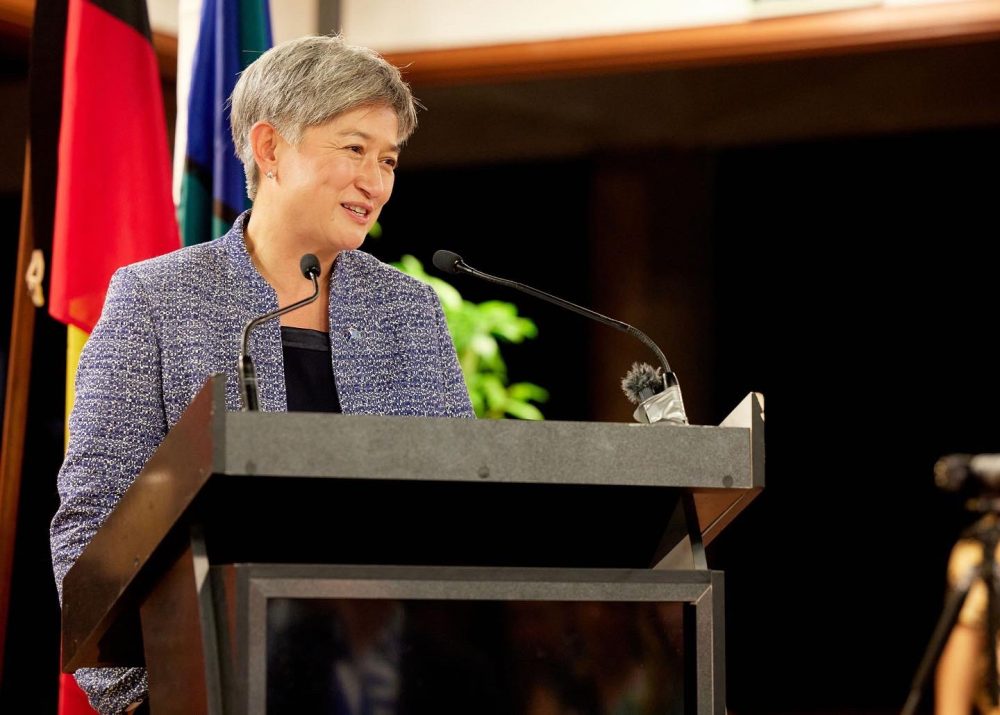
During her recent trip to Malaysia, Foreign Minister Penny Wong said she wanted Australia’s full diversity to be reflected in the Albanese government’s approach to diplomacy.
Not only does that mean better engaging with our migrant story—a timely statement given the recently released census data revealed more than half of all Australians are first- or second-generation migrants—but also incorporating a First Nations perspective in our approach to international relations.
Speaking in the capital, Kuala Lumpur, Wong echoed her election statements about building on the knowledge and experience of First Nations Australia: ‘The time has come for Australia’s full story to be told: our modern diversity and the rich heritage of First Nations peoples.’
Developing a First Nations foreign policy is arguably the biggest development in Indigenous relations in decades. NAIDOC week is an opportune time to ask—what is a First Nations foreign policy, and how does it differ from Australia’s approach in the past?
Much can be gleaned from the highly detailed Indigenous Diplomacy Agenda, launched by the Department of Foreign Affairs and Trade last year.
The Indigenous Diplomacy Agenda is about shaping the international system by understanding how states distribute power to Indigenous groups, how Australia’s diplomatic network can shape the international system to benefit Indigenous peoples economically and politically, and how Indigenous knowledge and ways of relating with others can be incorporated into Australia’s relations with other nations.
On the last point, this could mean ceasing to view international relations in zero-sum terms, instead moving towards concepts of reciprocity, co-development and mutual respect.
The agenda positions Indigenous affairs at the heart of Australia’s foreign policy, but it is important not to romanticise what this means.
Australia has a complicated and brutal postcolonial story and reckoning with this—demonstrating that we are learning, growing and strengthening democratic values—is a point of shared truth with other colonial nations. Forming a shared truth with our neighbours is a way for Australia to build trust, demonstrate shared values and exercise influence.
Shared truth is important when autocratic regimes are seeking to shift the conversation about human rights. Alongside China, Belarus, North Korea and Venezuela have raised Australia’s human rights record in international forums in an effort to muddy the waters of Beijing’s treatment of Uyghurs and other ethnic minorities.
Coupled with a First Nations foreign policy, Labor’s broader commitments to Indigenous affairs—including constitutional recognition and an Indigenous voice to parliament—have implications for national security, economic trade, development and government corporate policy.
In a national security context these commitments say that Australia cannot rely on influence, particularly in the Indo-Pacific, without demonstrating its commitment to Indigenous rights at home and abroad.
In economic relations these commitments say Australia cannot advance its trade agenda without also elevating Indigenous peoples here and elsewhere.
Australia also cannot promote sustainable development unless Indigenous peoples benefit.
It’s important to note that within the Commonwealth public service, these commitments will not move forward without more comprehensive recruitment and retention of Indigenous diplomats.
How Australia creates a joint narrative with its neighbours might help to solidify the basis for joint action on some of our common security threats, particularly climate security across the Pacific and in Southeast Asia.
Australia excels at capacity building in the Indo-Pacific, which will be key to implementing digital-economy and green-technology initiatives outlined in both the US-driven Indo-Pacific Economic Framework and the European Indo-Pacific Strategy.
An early sign of how Indigenous interests can play a role in strengthening regional ties can be seen in the New Zealand-led Indigenous Peoples Economic and Trade Cooperation Arrangement involving Taiwan, Canada and Australia.
This was an effort to build common economic goals between Indigenous groups but also an attempt to draw Taiwan in from diplomatic isolation. All but 15 countries have cut ties with the island and it is barraged daily with cyberattacks and intrusions into its air defence zone. Taiwanese Indigenous communities are the island’s international relations lifeline—they are Taiwan’s sole representatives to the UN.
This agreement shows, in clear-cut terms, the new posture in embryonic form: repositioning Australia’s relations with our Commonwealth partners—Canada and NZ—based on a central connection with Indigenous pasts and forging new economic and political ties with a nation—Taiwan—that shares a common ideal to advance the rules-based order. What will, and should, follow is cementing this posture in our agreement-making with other Pacific partners.

